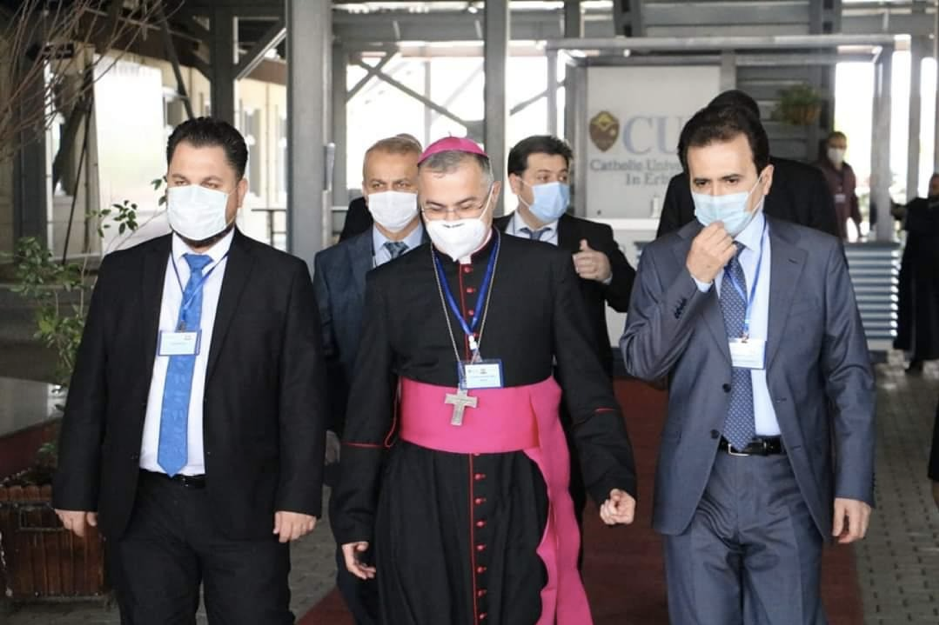As Iraq has responded to the complex challenges brought on by the COVID-19 pandemic it has provided yet another example of how religious institutions and religious leaders can play a vital role in society.
Religious leaders and institutions, particularly in the Middle East, have potential for significant influence in their societies. Understanding the role of religious leaders and institutions in the midst of the pandemic and associated economic and social challenges was the primary objective of “Encountering Coronavirus (COVID-19) Pandemic with the Support of Religious Leaders,” a recent initiative supported by KAICIID in collaboration with the Iraqi Kurdistan Region’s Ministry of Endowments and Religious Affairs, Ministry of Health, the Catholic University in Erbil-Iraq, and religious leaders from various backgrounds (Muslim, Christian, Mandaeans, Baha’is, and Yazidis).
Dr. Pshtiwan Sadiq, KRG Minster of Endowment and Religious Affairs, Archbishop Bashar Warda, and Amir Osman, Director of Religious Coexistence, participating in the “Encountering Covid-19 with the support of religious leaders” project in Erbil, Iraq.
“We, as a group of religious leaders, gathered today with [one] purpose, to protect the human race,” said one of the Muslim leaders, at a workshop held on July 7, at the Catholic University in Erbil. These leaders from various faiths came together to share best practices for how they had worked within their own community to respond to the challenges of the pandemic. They highlighted practical steps such as sharing guidance on best practices of hygiene and specifying public health concerns. They also discussed steps taken to modify or suspend certain aspects of communal worship for a time to mitigate the spread of the virus.
“Today, societies in the Middle East need support from religious leaders more than anytime to overcome the current coronavirus pandemic challenges,” said of the religious leaders from the Sabean Mandaean religious community.
An important theme of the conversation was that religious communities have a role to play not only within their community, but in engaging and serving those outside their own community and paying particular attention to the marginalized and vulnerable.
In challenging times, whether conflict or a health crisis, religious leaders can serve a vital role as figures who contribute to the good of society. Religious teachings can be utilized through these key players to ensure that the humanitarian and other efforts related to peacebuilding in the region have a greater effect. Furthermore, they can play essential roles in other fields, including the promotion of women rights, advocacy for the rule of law, and the eradication of extremism.
“Religious actors are a stable force in their communities. They do not come and go when conflict arises, and they stay in touch with their communities even in times of displacement. This makes them more consistent forces in their communities than most other kinds of elites, like economic elites or politicians. This contributes to the strong sense of legitimacy that many possess in their communities,” said Ann Wainscott, author of recent USIP report that focused on understanding the religious landscape in post-ISIS Iraq.
Yet, there is also potential for manipulating or instrumentalizing religious teachings by religious leaders to mobilize the public for political ends or to inflame sectarian divisions that contribute to conflict and violence.
Religious leaders and religious institutions could have either role. They can act as good or bad actors that can influence the wider society.
The “Encountering Coronavirus (COVID-19) Pandemic with the Support of Religious Leaders” initiative was intended to increase the collaboration between religious leaders and their communities to inspire collective action.
This requires courage and collaboration to first, call for interfaith collective action, particularly in a country where religious diversity has frequently led to marginalization and conflict. Interfaith collective actions often not only yield better results but also strengthen social cohesion and encourage people to pursue other collaborative activities such as business, sports, and arts. Second, the government has a role to play in promoting an environment that fosters local and national coordination between governmental, non-governmental, and faith-based entities to implement projects jointly that address peoples’ needs on the ground.
While the challenges facing Iraqi society are extensive, now is a critical time to transform the role of religious leaders and religious institutions to get more of them involved in humanitarian activities that serve to address tangible needs in society.
THE RFI BLOG

Myths of Religious Nationalism in America and Abroad

France’s Olympic Hijab Ban Violates International Law And Exacerbates Tensions

RFI Briefs USCIRF on Lessons from 25 Years of U.S. Designating Religious Freedom Violators

Thought Police: Protecting the People from Prayer

A Religious “Delaware”: Establishing a State Haven for Religious Corporations
CORNERSTONE FORUM

Challenges to Religious Freedom in Iraq and the Critical Need for Action

Public Bioethics & the Failure of Expressive Individualism

Religious Liberty in American Higher Education

Scotland’s Kate Forbes and the March of Secularism


